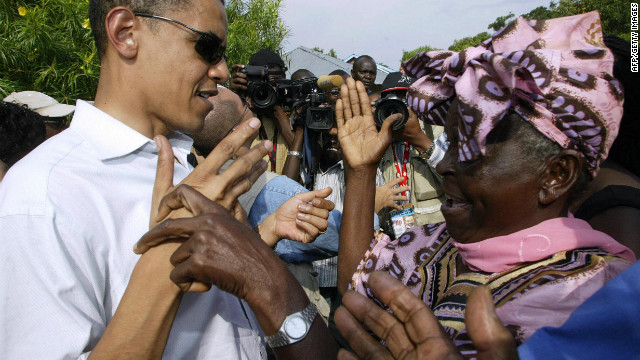Obama’s African outlook splits opinion ahead of visit
The 44th US president inspired millions when he told an audience in Ghana during his first year in office that he would help build prosperity in a resurgent sub-Saharan region many believe will be the world’s next economic powerhouse.
When he returns on June 26 for a tour of Senegal, South Africa and Tanzania, however, he will encounter a continent where his influence has largely been usurped by the billions of dollars invested by the world’s emerging economies.
“As he travels to Africa, he will see a definite different Africa that enthusiastically celebrated his election and re-election but an Africa that is asking: What have you done for me, not lately but ever?” Chika Onyeani, editor of the US-based African Sun-Times, wrote in a recent commentary.
Obama’s detractors concede that he has led the way in African conflict resolution, particularly with the peaceful creation of South Sudan after decades of fighting between Sudan’s Muslim north and Christian and animist south.
But critics argue that while the US plays global referee, China has been more shrewd in its engagement, stepping up investment in mining, trade, construction and infrastructure.
Africa has been home to six of the world’s 10 fastest-growing economies in the past decade, according to a 2010 study by the McKinsey Global Institute — a number that is projected to grow.
Foreign direct investment is forecast to attain $57 billion (42.8 billion euros) this year from $50 billion last year, with the sub-Saharan region likely to receive the majority, according to the African Development Bank.
Yet just one percent of US investment abroad goes to Africa and many analysts believe China has surpassed America as its largest partner, with African governments preferring an approach that does not link trade to human rights or corruption.
US companies are “leaving money on the table” in mineral- and oil-rich Africa, industrialist Tribert Ayabatwa Rujugiro, who has businesses in eight countries across the continent, said in a recent commentary for the US-based Global Post.
A 2012 study by Russian investment bank Renaissance Capital underlines the point, arguing that Africa will be the “most exciting and rewarding continent for the next 30 years”, producing more GDP in 2050 than the United States and Europe combined today.
Obama has spent less than 48 hours on official business in Africa, between trips to Egypt and then Ghana in June 2009.
But his supporters say the president has not received credit for encouraging economic growth by aiding peaceful transfers of power in Ivory Coast, Nigeria, Senegal and Malawi as well as promoting democracy in Niger and Guinea.
“The president is the victim of unrealistic expectations, largely because he had a Kenyan father,” John Campbell, a senior fellow for Africa policy studies at the US-based Council on Foreign Relations think-tank, told AFP.
“Sometime African commentators forget that the president is an American, not an African.”
Campbell believes US investors get cold feet when they see conflicts such as in Mali and corrupt or inept governance elsewhere, worrying that their cash will end up in the hands of unsavoury, undemocratic regimes — and the enmity is often mutual.
“Certainly African elites prefer the Chinese model because it reinforces their own position. Democrats, human rights activists — the future of Africa — have a different view.”
In any case, says Campbell, economic developments in Africa are “largely marginal” to the fundamental interests of the United States and Americans should “focus on what we do well — democracy, human rights and the rule of law.”
“That, after all, is what will enable Africa to break out of its cycle of poverty,” he said.
J Peter Pham, director of the Washington-based Atlantic Council’s Ansari Africa Center, believes the Chinese investment boom cannot last and that there will be a correction in the balance of power.
“In the immediate term, Africans want to feed and provide (for) their families and, in order for that to happen, they must see their economies grow through investment in both infrastructure and business. So there is an attraction to whatever delivers infrastructure and investment,” he said.
“However, both need to be solid and benefit Africans… and thus we encounter the growing chorus of discontent from many Africans that Chinese construction is often shoddy and Chinese companies are more interested in resource extraction than in adding value in Africa.”
_____________________________________________________________________________________
Woman sues lover for alleged criminal force, intimidation
Mararaba (Nasarawa State) A woman, Blessing Yusuf, 27, of Ruga Village in Mararaba, Nasarawa State on Thursday sued her boyfriend, Tofa John over alleged criminal force and intimidation.Yusuf, in the suit filed in a Grade 1 Area Court, Mararaba accused her boyfriend of beating her and tearing her cloth on June 19.
“He came to my house as usual and insisted that we should go out.
“We went back to my place after the outing but I noticed that he was very drunk.
“Without provocation, he pushed me against the wall, tore my cloth and start beating me.”
Yusuf said that she ran to the police station naked and reported the matter.
“This is not the first time he is assaulting me.
“There was a time that he used a sharp object and cut the lower part of my ear with it,” she said.
However, John denied the allegation.
“She is my girlfriend. We have been going out for over one year now.
“We drank some bottles at a beer joint and became drunk.
“On our way home she started insulting me and we had a misunderstanding.
“I did not tear her dress, it was a simple misunderstanding,“ he told the court.
The Presiding Judge, Mr Alfred Maga, adjourned the case to July 11, for further hearing. (NAN)


0 comments:
Post a Comment